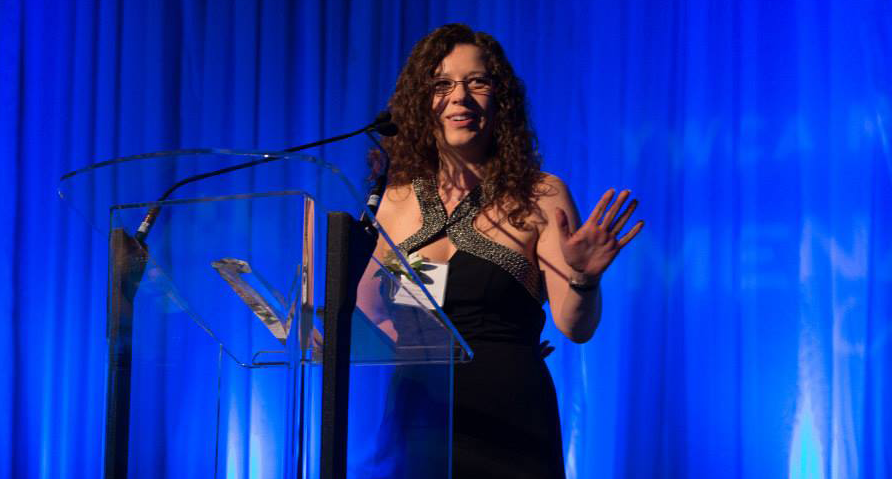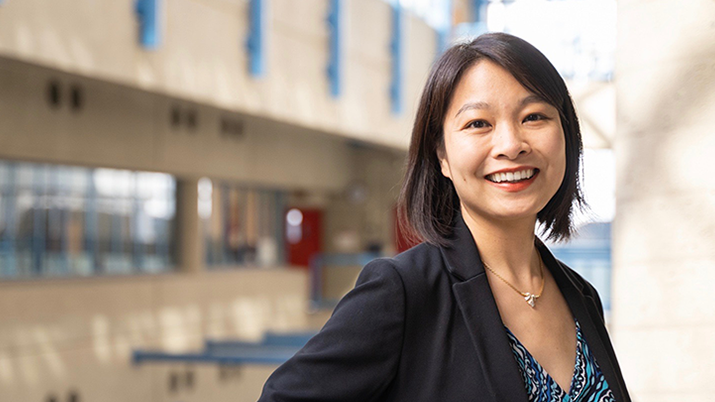

Dr. Liisa Galea at the 2015 YWCA Metro Vancouver Women of Distinction Awards
On May 26, 2015, YWCA Metro Vancouver announced the winners of its 32nd annual Women of Distinction Awards. Among them was UBC Psychology professor Dr. Liisa Galea, recipient of the Technology, Science and Research award.
Dr. Galea (@LiisaGalea) is one of the few researchers in the world to study the female brain. Her research centres on understanding how hormones influence the female brain across the lifespan and she received this award in recognition of her research accomplishments.
We sat down with Dr. Galea to learn more about her research and her perspectives on the role of women in science.
First of all, congratulations on your Women of Distinction Award! What does this award mean to you?
It is such an honour to have been nominated in the first place and I did not expect to win. It’s humbling to be included with all those amazing, accomplished women in Vancouver who were at the award ceremony as nominees and volunteers. I heard some inspiring acceptance speeches that night and I was just happy to be a small part of the ceremony. The announcement and presentation was a bit of a blur. I did not have a speech ready – as I was so sure I would not win. The ironic part is that in my bio (which they voiced as I walked up to the stage) they indicated that I was a gifted speaker. I believe I thanked chocolate as my inspiration and forgot to thank my husband who really has had my back all these years. So thank you, Steven!
What has led you to explore the female brain?
I‘ve always been curious about potential sex differences in the brain. At the age of 12 I wrote down 10 things I wanted to know more about – and one was about whether and how women’s brains might be different than men’s brains! From a young age I didn’t understand why women were treated differently than men. When I got into science at university I noticed that most of the neuroscience studies used male subjects and I was convinced that we needed more studies in females. When I was pregnant with my first and then second child, I was overwhelmed by how much those hormones could impact my body. I thought back to puberty and how it ‘shaped’ my mind and I thought someone should really study how pregnancy and pregnancy hormones impacts the brain in more depth. Voila, here I am 19 years later.
Did you have any mentors or role models growing up that led you to this career? How did they influence you?
Well first and foremost my mother, my maternal aunt and maternal grandmother were huge influences to me to strive to be a scientist. I grew up in the 70s when not a lot of women were professionals. Each of these talented women were professionals (accountants, teachers), worked full-time and had thriving personal lives while also raising children. They had strong personalities which filled me with pride and gave me great examples on which to model my own life. I am fiercely proud to have had such strong and powerful women in my heritage. They taught me to follow my curiosity, think for myself and think outside the box. They taught me to challenge my views and to back up my views with data. They were especially vigilant if someone told me that I could not do something because I was a girl. I grew up thinking that being a woman was not going to be a barrier.
Professionally, the late Prof. Doreen Kimura was an early positive influence for me. Doreen was an excellent scientist and a formidable woman her nickname was Dragon Lady, which perhaps nowadays we would associate with the powerful image of Daenerys Targaryen from Game of Thrones. Just like the character Daenerys, Doreen knew her mind and followed her instincts even if it meant others around her would protest. She was extremely intelligent and she taught me not to believe everything I read. This was a powerful lesson – to understand that just because an expert had written something you still could challenge it. All of my early mentors persevered, despite the hardships of growing up in the 50s and 60s as a working woman. Equally important and influential was Dr. Joanne Weinberg, who is now Professor Emerita here at UBC. She was my mentor when I first started as a professor at UBC. Joanne has this fantastic professional career and family life. I once asked her about balancing work and life when I first started as a professor and she gave me the perfect advice. She said there is no such thing as work/life balance. That sometimes your life will take over, such as a sick child or parent, and that sometimes work deadlines and teaching obligations will take over. She made it sound more like a seesaw rather than a balancing act. It was very freeing to let go of the impossible and just ride the roller coaster that is life.
How can we get more girls interested in science?
I actually don’t think this is a problem. I think girls – and boys – are inherently interested in science from a very early age, such as an interest in dinosaurs, bugs, cars, colours, stars. What is more of an issue is keeping them in science. Science is very much a male dominated field and sexism in science runs rampant as evidenced by recent events in the news (#TimHunt and #DontAskAlice). It pains me to see women trying to do their jobs but being treated badly (#FHRITP). As a society we need to call this behavior out and hopefully, given many examples of the diversity of women in science/authority, this type of behavior will become a thing of the past. Twitter has been great for some of this; #DistractingSexy in response to #TimHunt (also see #inhershoes). We need scholarships, fellowships and career awards specifically for women at all stages of their career.
Recently two prominent UBC scientists, Professor Judy Illes and Dr. Catherine Anderson, resigned from the selection committee of the Canadian Science and Engineering Hall of Fame over concerns that there are no female candidates among the finalists. In your own words, what does this message send?
It is time that women stand up for sexism in science. There have been a few heroic men standing up for women (Tim Bussey at the University of Cambridge and the ‘He for Her’ UN campaign) but we need women to stand up for themselves and for other women. Unfortunately some women hinder the progression of women in science and other professions (#womenagainstfeminism). That is why I think the resignation by Judy and Catherine was so important. It is a very public announcement in support of the recognition of women in science. I’ve heard women say they have never experienced sexism and then make the erroneous conclusion that sexism in science (or other) doesn’t exist (#notallshoes). That’s a crazy statement. It is like me saying that I’ve never experienced racism – but that doesn’t mean it doesn’t exist.
As scientists in particular we need to hold ourselves to evidence based information, not anecdotal comments. Therefore it was important for these influential Canadian women to take a stand. It might interest people to know that Drs. Illes and Anderson voiced their concerns the year prior to that committee and when nothing changed the following year (no nominations of women) that’s when they resigned. We all need to take a stand. Let our voice be heard. It will mean the world to those who feel that they can’t take a stand or feel the need to suffer in silence.
In closing, do you have any words of encouragement to other women pursuing science as a career?
My parents taught me that to enjoy your life you need to enjoy your work. If you love what you do – hopefully the rest will fall into place. If you are no longer enjoying yourself seek advice from others that you would most like to emulate. Don’t stop at with one person, ask many people for advice. You will find the advice is surprisingly diverse and I have found it best to follow the advice that rings the most true for your character. Definitely interview your potential supervisors as much as they interview you. If you run up against barriers try to find a way around them (up and over, around or through!). Find some great work friends and fill your life with laughter and love – life’s too short without lots of either.
-Bonnie Vockeroth
Related:
- VIDEO: UBC neuroscientist Liisa Galea discusses ‘baby brain’ and other ways that motherhood changes a woman’s brain chemistry
- UBC Psychology faculty receive 2015 Dean of Arts Faculty Research Award and Killam Teaching Prize
- UBC Psychology prof. Liisa Galea a 2015 YWCA Women of Distinction Award recipient
- UBC Psychology prof. Liisa Galea a 2015 YWCA Women of Distinction Award nominee


